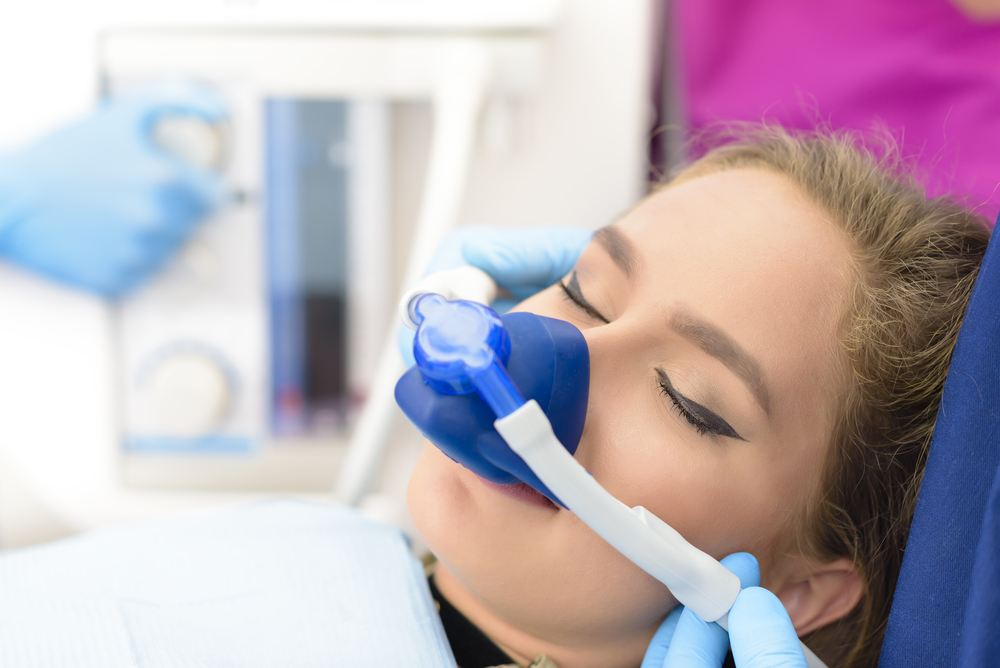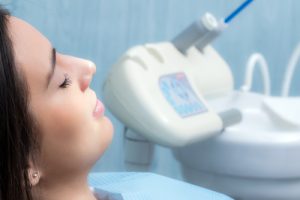

Sedation Dentistry for Stress-Free Dental Care!
Are you one of the many people who dread going to the dentist due to anxiety or fear? Sedation dentistry might be the solution you’re looking for. Our Staten Island dentists use various sedation methods to help patients feel relaxed and comfortable during dental procedures.
To schedule an appointment, contact us today by calling (718) 948-5111.
What Is Sedation Dentistry?
Sedation dentistry is a form of dental care that uses medication to help patients feel more relaxed and at ease during dental procedures. This approach is especially beneficial for patients with dental anxiety or fear, as well as those undergoing extensive or complex dental treatments.
Types of Sedation in Dentistry
Nitrous Oxide (Laughing Gas)
Nitrous oxide, also known as laughing gas, is a colorless gas used as an inhalational anesthetic agent in dentistry. It’s an anxiolytic/analgesic agent that induces central nervous system depression and varying degrees of muscle relaxation and euphoria while minimally impacting the respiratory system. Nitrous oxide sedation has a rapid onset, with calming effects beginning within three to five minutes, and a quick elimination, allowing patients to drive themselves home after the procedure.
Nitrous oxide sedation is generally considered safe for both adults and children and can be administered by most dentists. It’s administered by inhalation through a mask or nosepiece and is often used for patients who require minimal sedation during dental procedures.
Oral Sedation
Oral sedation utilizes medication administered orally in the form of a pill to help patients feel more comfortable and relaxed during dental procedures. It offers minimal to moderate sedation by diminishing the senses and alleviating anxiety. Patients under oral sedation typically experience grogginess and may even fall asleep, but they remain conscious and able to communicate with the dentist if needed.
Due to the temporary impairment of memory and motor skills caused by the medication, it’s recommended that patients arrange for a companion to drive them home after the procedure.
Intravenous (IV) Sedation
Intravenous (IV) sedation delivers sedative medication directly into the patient’s bloodstream through an intravenous tube connected to a thin needle. This method allows for a more precise control of the level of sedation, making it especially useful for patients who require a deeper level of relaxation during their dental treatment. IV sedation typically provides a more profound effect compared to other methods.
Eligibility for Sedation Dentistry
Determining whether you’re a good candidate for sedation dentistry depends on several factors, including your medical history, dental anxiety, and the specific dental procedures you need to undergo. In general, patients who have a history of dental anxiety or fear, need multiple procedures in one appointment or require complex or lengthy treatments are good candidates for sedation dentistry.
However, a consultation with a qualified dental professional is necessary for a thorough assessment of your medical history, overall health, and the type of dental procedure you require, to determine if sedation dentistry suits your needs.
What to Expect During the Procedure
During a sedation dentistry procedure, our dentists will administer sedative medication to facilitate relaxation and a feeling of calmness during the dental treatment. Throughout the procedure, our dentist and their team will closely monitor the patient’s vital signs, such as heart rate, blood pressure, and oxygen levels, to ensure their safety and well-being. After the procedure, patients may feel groggy or drowsy due to the sedative medication, and it’s recommended that they arrange for a companion to drive them home.
Frequently Asked Questions
Is sedation dentistry safe for everyone?
Sedation dentistry is generally considered safe when performed by a certified and experienced dentist who adheres to established safety protocols. However, certain patients with specific medical conditions or allergies may not be suitable candidates for sedation dentistry.
Can I drive myself home after a sedation dentistry appointment?
Depending on the type of sedation used, you may need to arrange for a companion to drive you home after your appointment. For example, patients who undergo IV sedation or oral sedation typically experience temporary memory and motor skill impairment and should not drive themselves home.
How long does it take for the effects of sedation dentistry to wear off?
The duration of the sedative effects will depend on the type of sedation used and the individual patient’s response to the medication. For example, the effects of nitrous oxide sedation typically wear off quickly, allowing patients to resume normal activities shortly after the procedure. With oral or IV sedation, the effects may last longer, and patients may require more time to recover.
Are there any side effects or risks associated with sedation dentistry?
While sedation dentistry is generally considered safe, there are potential side effects and risks, such as nausea, vomiting, drowsiness, allergic reactions, or respiratory depression. It’s important to discuss these risks with your dentist before undergoing a sedation dentistry procedure.
Transform Your Dental Experience With Sedation Dentistry
Sedation dentistry offers a solution for patients who experience dental anxiety or fear, as well as those undergoing extensive or complex dental procedures. It’s essential to consult with our Staten Island dentists to determine if sedation dentistry is the right choice for you and to ensure that proper safety protocols are followed during the procedure.


